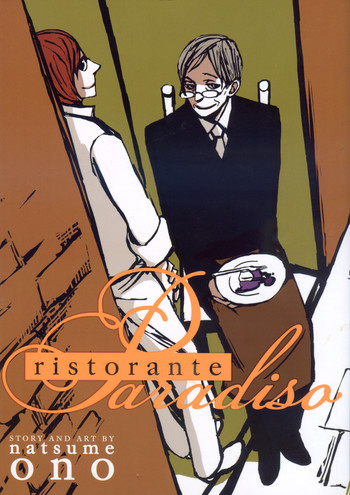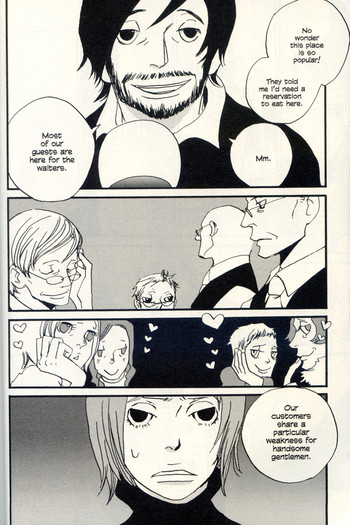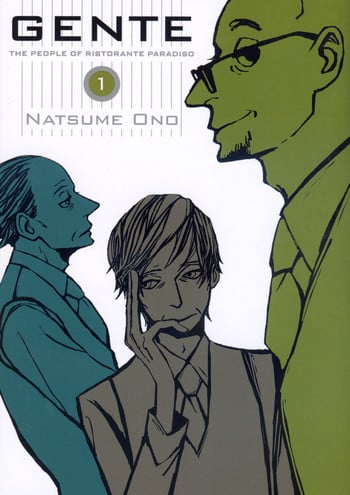House of 1000 Manga
Ristorante Paradiso and Gente
by Shaenon K. Garrity,


In last week's column, Jason commented, “There's plenty of manga about oyajicon (old guy fetish), like Ristorante Paradiso.” But really, there kind of isn't. Manga skews young, especially the manga that makes it to English translation, and most teenage readers aren't that into old guys. Sorry, old guys. It can be jarring for aging otaku like Jason and myself to read BL manga where the “experienced older man” character is well under 30 (but has had time to establish a career as a politician/hotel-chain owner/police detective/blind psychic chiropractor), and let's not get started on moe manga were the “older woman” in the cast is maaaybe 16. There's a manga for every fetish, but some fetishes get more space than others.
Like, for example, a fetish for middle-aged Italian men in glasses, for which there surely is only one manga, and that manga is still Ristorante Paradiso. It's a very classy fetish manga, mind. It originally ran in the magazine Manga Erotics F, which publishes a lot of mature artsy/sexy manga, like Inio Asano's A Girl by the Seaside and the works of Usamaru Furuya, with varying levels of explicitness.
Here there's no sex, just endless genteel foreplay around kitchens and tables and bottles of good wine. It feels like Natsume Ono was inspired by the mood of those old ultra-subdued erotic European films like Éric Rohmer's Claire's Knee, where a middle-aged man is overwhelmed by the desire to touch a teenage girl's knee, and eventually does so, and is satisfied. It's sophisticated and intellectual and the pleasures that consume it are elegant ones: a well-cooked meal, a little dolce, good wine from a friend's vineyard, conversation about old times and new loves. But if you're not into older men in glasses with Al Pacino circles under their eyes, it's probably not for you.
Ristorante Paradiso is a small, impeccable restaurant in Rome with a full reservation list. The regulars come half for the food, half for the waiters, who are all handsome and charming bespectacled men ranging from their 40s to their 60s. It's like a super-classy Italian version of a Japanese maid/butler café, with the staff calling patrons “Signorina” instead of “Master.” The owner is an unshaven, laid-back bear of a man who is neither silver-haired nor nearsighted, but staffs the ristorante to tickle the tastes of his wife, the fiery Olga. What more loving gift could a husband give his wife than a gourmet restaurant stocked with her favorite flavor of eye candy? And also wine? Hmm…now that I'm thinking about it, that might be impossible to top.

Men are generous to women in this manga. Some of the waiters are surly and standoffish, but only because the wounded lion-in-winter routine is charming, or because they've been stung by past loves and need another chance. Others, like the gentle, sad-eyed divorcée Claudio, are sweetly caring and chivalrous. And all have impeccable manners. This is very much a manga in the “stop in and visit some likable characters in a pretty setting” mold, as opposed to the “stuff is actually going to happen” mode.
In the one-volume Ristorante Paradiso, college-age Nicoletta arrives at the ristorante looking for Olga, her estranged mother. Nicoletta is the child of Olga's first marriage, and Olga has been keeping her existence secret because her current husband didn't want to marry a woman with children. Is Olga just about the worst mother in the world, not to mention irrationally paranoid given the unlikelihood that her superhumanly agreeable husband—this is, remember, the man who staffed his restaurant with silver foxes for his wife's pleasure—is going to flip out over Nicoletta? Yes. Yes, Olga is a hot Italian mess.
Nicoletta intends this to be a short visit, just to check in on her deadbeat mom. But she's surprised to find herself captivated by those waiters. Could she have inherited her mother's taste in men? Nicoletta gets a job in the ristorante kitchen and grows closer to the quiet Claudio. Somehow the age difference doesn't seem insurmountable—or quite so creepy—when the younger woman is the aggressor and the older man is so darn nice. But Claudio is still hung up on his ex-wife. There's only one way to sort this out: with long, leisurely meals and conversations on the theory and practice of love. To continue with the movie comparisons, this may be the ideal companion manga to Richard Linklater's Before trilogy, with its couple philosophizing and arguing their way through picturesque European cities.
The travelogue angle is a big part of the appeal of Ristorante Paradiso, second only to the old-guy glasses fetish. More than anything, Natsume Ono seems interested in capturing the mood of Italy, or at least the romantic Italy of its films and literature. She's not much for detailed background drawings, so she focuses on small cultural details: well-cut clothing, pasta dishes, cups of espresso. And on the characters’ faces, and the leisurely pace of conversation that almost conceals the urgency of emotion underneath. And on hot-tempered women and men who mellow like good wine.
Ono's visual style is unusually suited to this material; her loose, thick-lined indie-manga look wouldn't be out of place among European bandes dessinées, or maybe the output of an American alternative-comics publisher. She sets a lot of her manga in Europe or North America, and most of her works are Western-style one-volume graphic novels, as opposed to the ongoing series format more common in Japan. (Interestingly, her longer series, like House of Five Leaves and the untranslated Tsura Tsura Waraji, tend to be set in historical Japan.) There are times when Ono's draftsmanship is sloppy, but more times when her abstract exaggeration captures a gesture or a mood with heart-stopping truth. This isn't one of her stronger manga, story-wise, but it's still lovely to look at.

The fetish for Europe overtakes the fetish for glasses in Gente, Ono's three-volume sequel to Ristorante Paradiso. A series of short stories delves into the past of the ristorante and its staff and explores the lives of some of the patrons. Lacking the strong central plot thread that keeps Ristorante Paradiso moving, the stories frequently muddle along and dissolve into directionless conversation. Also, it starts to get hard to keep all the handsome old men straight. (I mean to remember which is which, not to keep them from boning each other, which sadly never happens.) There are standout stories, like a cute one about an Italian politician and his fortunetelling granddaughter—and where in real life are you going to find a cute story about an Italian politician?—and some of the flashbacks to the early days of the staff members. I also like the tough-as-nails female chef who appears in a number of stories, guiding and inspiring the men who will later staff Ristorante Paradiso. But Gente is a mixed bag compared to the stronger, sparer Ristorante.
By now, even if you haven't read Ristorante Paradiso and Gente, you can probably tell whether you'd like them. Do you enjoy romantic tension? Erudite conversations about love delivered with wry smiles and deep-set gazes? Tiny cups of coffee and huge glasses of wine? The dream of Europe flickering in a darkened movie theater? Nearsighted gentlemen serving up cannoli? Last year a Portuguese man of a certain age escorted me around Lisbon, recounting the history of the city and proudly showing off the view from each of its seven hills, and afterwards we went to a tiny restaurant at the end of a long, darkened string of piers, where we had cold calamari salad and salt cod stew and many glasses of wine. I understand what Natsume Ono is trying to evoke here. She comes close, so close.
discuss this in the forum (11 posts) |